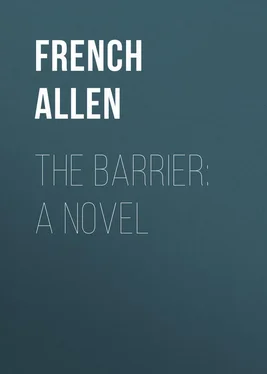Allen French - The Barrier - A Novel
Здесь есть возможность читать онлайн «Allen French - The Barrier - A Novel» — ознакомительный отрывок электронной книги совершенно бесплатно, а после прочтения отрывка купить полную версию. В некоторых случаях можно слушать аудио, скачать через торрент в формате fb2 и присутствует краткое содержание. Жанр: foreign_antique, foreign_prose, на английском языке. Описание произведения, (предисловие) а так же отзывы посетителей доступны на портале библиотеки ЛибКат.
- Название:The Barrier: A Novel
- Автор:
- Жанр:
- Год:неизвестен
- ISBN:нет данных
- Рейтинг книги:4 / 5. Голосов: 1
-
Избранное:Добавить в избранное
- Отзывы:
-
Ваша оценка:
- 80
- 1
- 2
- 3
- 4
- 5
The Barrier: A Novel: краткое содержание, описание и аннотация
Предлагаем к чтению аннотацию, описание, краткое содержание или предисловие (зависит от того, что написал сам автор книги «The Barrier: A Novel»). Если вы не нашли необходимую информацию о книге — напишите в комментариях, мы постараемся отыскать её.
The Barrier: A Novel — читать онлайн ознакомительный отрывок
Ниже представлен текст книги, разбитый по страницам. Система сохранения места последней прочитанной страницы, позволяет с удобством читать онлайн бесплатно книгу «The Barrier: A Novel», без необходимости каждый раз заново искать на чём Вы остановились. Поставьте закладку, и сможете в любой момент перейти на страницу, на которой закончили чтение.
Интервал:
Закладка:
And he knew she was not posing. "It is sometimes troublesome to be friends with people," he said. "To be bound to them, to have considerations of them prevent free action – that is what friends mean in business."
"And you have few, as well?"
"I have dependents."
He spoke wisely, for the term struck her. Dependents! She had felt isolation, but it was that of the looker-on. There was something regal in this man's loneliness, for that he was lonely she divined.
"People need you," she said with approval. "They cannot get along without you. Oh!" she exclaimed, "I have sometimes thought what power is in the hands of such men as you. You can mould a whole community; you can set your mark on a city so that it will tell of you forever." Behind a steady face he concealed astonishment and question. "You can do so much good!" she finished.
"Much good – yes," he returned uncertainly. Such enthusiasm was new to him, especially when applied to what the opposition newspapers bluntly called "jobs." He perceived that where he saw only money in his enterprises, Judith saw great opportunities. "Yes, much good – if we can only do it. Where there is power there is also responsibility. How can a man know whether he is doing the right thing, especially" – and he smiled – "when all the newspapers say he is doing wrong?"
"A man must follow his conscience," she replied, so gravely that he was uncomfortable, for, thus innocently spoken, her words carried a sting. He tried to finish the subject, and by his usual method – by meeting it directly.
"A man works as he can," he said, "doing what seems best. He has to think of the present, but as you seem to know, he works for the future too. It is an interesting life and a busy one."
"Interesting?" she echoed. "Oh, it must be! Why should it not be all-sufficient? Why should you come here?" He stared at her again, and she asked: "What have we that can interest you?"
He answered with a simplicity that was almost great, an acknowledgment of his desires which was unparalleled in his career, but which meant that without hesitation he put himself in her hands, to betray if she wished, but perhaps to save. He waved his hand toward the groups behind him.
"I want to get in," he said.
"To get in?" She smiled, and he doubted. "To get in, when I sometimes wish to get out? In here it's so dull!"
"I don't care for that," he replied.
"Sit down, then," she directed. "Let us talk it over."
Seated on a bench, half-facing, each had a moment to consider. She did not take it; he did, for he was beginning to recover himself and to study her. Beauty and grace, with that direct glance and genuine voice, were her chief outward characteristics. Of her inward motives, most prominent appeared her desire for something new; more strong, perhaps, was her interest in matters beyond her sphere. This interest of hers was to him a gift of fortune; it might bring him anywhere. But to Judith this situation was new; therefore she enjoyed it. She paused no longer than to consider what she should ask him next, and then pursued the subject.
"How have you meant to go about it?" she inquired.
"Why," he hesitated, "my friends – "
"What friends?"
He acknowledged frankly: "I have but one – Mrs. Harmon."
"Oh, only Mrs. Harmon?"
Only! The tone and the word struck him. Was Mrs. Harmon, then, not fully in? His mind reached forward blankly: who else could help him?
"But you must know some of our men," she suggested.
"Business acquaintances, yes," he said. "Yet they take care that I shall remain a business acquaintance merely. No, I must reach the men through the women."
"And the women?" she asked. "How will you reach them? Mrs. Fenno, for instance, knows only one kind; she is iron against innovation. How will you get on her list, or Mrs. Watson's, or Mrs. Branderson's?"
He did not answer. She saw that he was biting on the problem, and that it did not please him. She made a positive statement.
"No. It is the men you must rely on."
And he, weighing the facts, believed her, though it went against his former notions. The women – this day he had first seen them at close quarters, and had felt them to be formidable creatures. The severe majesty of Mrs. Fenno – how could he impress it? And Mrs. Branderson had, beneath the good humour of her reception of him, the skill to chat easily, and then to turn her back without excuse. He bit his mustache – the women!
She was watching him with a half-smile. "Do you not agree?"
"But which men, then?" he inquired.
"Have you no influence over a single one?"
"There is young Mather," he said thoughtfully.
Her manner changed; she drew a little more within herself, and he noted the difference in her tone as she asked: "You have some connection with him?"
"None," he said. "But I can help him."
"How?"
"He is out of work," Ellis explained. "He will be fretting his heart out for something to do. I could offer him some position."
"Do!" she said. "He is right here. – George!" she called.
CHAPTER III
No young man can bear to sit down idly under misfortune; but though the chief results of Mather's work were lost to him, and his great plans – his subway – swept away, and though his defeat rankled, he had not suspected personal feeling in Ellis's action. The promoter had merely stretched out his hand and taken, repudiating the pledges of those who spoke in his name.
Therefore, in spite of the little shock which Mather felt when he saw Ellis with Judith, he came forward and greeted politely. It was a chance, of course, to "get back"; it would have been easy to express surprise at the promoter's presence, and to ask how he liked the club now that he really was there. Mather felt the temptation, but there was too much behind his relations with Ellis for the younger man to be rude, and he presently found himself saying: "I don't suppose you play golf, Mr. Ellis?"
"No," Ellis answered. This was the first man who had greeted him freely that day, and yet the one who most might feel resentment. While his manner showed that he was about to speak again, Ellis looked the other over with a smile which concealed deliberation. It was not weakness that made Mather mild, in spite of Mrs. Harmon's belief, to which she clung the more because the Judge rejected it. "I knew his father," her husband had told her. "They are bulldogs in that stock." Ellis took much the same view; once, at the beginning of his career, he had encountered Mather's father, and had found him a bulldog indeed. The son seemed the same in so many respects that Ellis wondered if he had thought quite long enough in seizing this morning's opportunity. He knew well that Mather would be stronger when next he entered the arena; besides, the reform politicians, those bees who buzzed continually and occasionally stung, had been after the young man, who, with the leisure to enter politics, might be formidable. Thus Ellis, hesitating, ran over the whole subject in his mind; and then, as he knew how to do, plunged at his object.
"Mr. Mather, I am sorry for what happened this morning."
"Fortune of war," returned the other.
The young man certainly had a right to be bitter if he chose, judging, at least, by the usual conduct of victims. Mather's peculiarity in this did not escape Ellis, who spoke again with some hope of forgiveness. "I trust that you and I may some day work together."
"I scarcely expect it," was the answer.
"Don't say that." Ellis was not sure what tone to adopt, but did his best. "This is not the place to speak of it, perhaps, but there is surely something I can do for you."
"Now that you have nothing to do, you know," said Judith.
Mather turned to her; he saw how she had put herself on Ellis's side; how her interest in this offer was due to Ellis, not to himself. And the reminder of his defeat was most unwelcome.
Читать дальшеИнтервал:
Закладка:
Похожие книги на «The Barrier: A Novel»
Представляем Вашему вниманию похожие книги на «The Barrier: A Novel» списком для выбора. Мы отобрали схожую по названию и смыслу литературу в надежде предоставить читателям больше вариантов отыскать новые, интересные, ещё непрочитанные произведения.
Обсуждение, отзывы о книге «The Barrier: A Novel» и просто собственные мнения читателей. Оставьте ваши комментарии, напишите, что Вы думаете о произведении, его смысле или главных героях. Укажите что конкретно понравилось, а что нет, и почему Вы так считаете.












